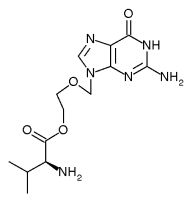Genital herpes simplex virus (HSV) infections continue to be a significant problem, particularly in sexually active young adults. After the initial episode of the infection, over 90 percent of patients have clinical recurrence of the infection. Suppressive therapy with acyclovir has been established as both safe and effective in managing recurrent episodes of HSV infection. The recommended dosage for acyclovir is 400 mg twice daily. Valaciclovir is a newer antiviral agent that, because of its greater bioavailability, may be effective in suppressive therapy using once-a-day dosages. Reitano and associates examined the efficacy and safety of various dosage schedules of valaciclovir compared with acyclovir and placebo in the treatment of recurrent genital herpes.
Men and women with a history of six or more genital HSV recurrences per year were enrolled in a multicentered, randomized, double-blind trial. To be included in the study, patients had to have documented genital HSV infection and a history of recurrent episodes. Those already taking suppressive therapy had to stop taking medication for three months before the study. The patients were divided into two groups, those with a history of fewer than 10 recurrent HSV episodes and those with 10 or more recurrences. The six treatment arms of the study included valaciclovir in dosages of 250 mg once daily, 500 mg once daily, 1 g once daily or 250 mg twice daily, acyclovir in a dosage of 400 mg twice daily, and placebo. Treatment lasted for one year. All patients were evaluated before the study and monthly during the study. The patient was evaluated within 24 hours of a recurrence. If a recurrence was documented, the patient was given episodic valaciclovir for five days. Patients kept diaries to record recurrences, use of concomitant medications and adverse side effects.
A total of 1,479 patients enrolled in the study; 1,050 patients completed the protocol. The demographics were similar in all the treatment groups. With regard to efficacy, all treatment groups were better than the placebo group. Patients who received valaciclovir and acyclovir twice daily showed no difference in the number of recurrences. In patients with a history of 10 or more recurrent episodes of genital herpes per year, the most effective dosage of valaciclovir was 1 g per day. In patients with less than 10 recurrent episodes annually, valaciclovir in a dosage of 500 mg once daily was as effective as a dosage of 1 g daily. The results of these regimens were similar to those of a regimen of acyclovir twice daily. The incidence of adverse outcomes in all of the regimens, including placebo, were similar. Most of the adverse effects were mild and well-tolerated; the most frequent side effects were headache, rhinitis, infection and flu-like syndrome.
The authors conclude that the study supports the use of valaciclovir as suppressive therapy for recurrent genital HSV infections. In patients with a history of less than 10 recurrent episodes per year, 500 mg of valaciclovir once daily is the appropriate starting dosage. In patients with more frequent recurrences, valaciclovir, in a dosage of 1 g daily or 250 mg twice daily, or acyclovir, in a dosage of 400 mg, would be the most effective therapy.
Reitano M, et al. Valaciclovir for the suppression of recurrent genital herpes simplex virus infection: a large-scale dose rangeEfinding study. J Infect Dis September 1998; 178:603-10.
COPYRIGHT 1999 American Academy of Family Physicians
COPYRIGHT 2000 Gale Group



